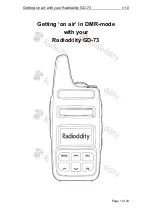
70 | Implementing the Network
Aprisa SR+ User Manual 1.11.1
Initial Network Deployment
Install the Base Station
To install the base station in your network:
1. Install the base station radio (see
on page 80).
2. Set the radio Network ID to a unique ID in your entire network (see
on page 111).
3.
Set the radio operating mode to ‘base station’ (see ‘
4. Set the radio IP address
(see ‘
IP > IP Setup > Bridge / Gateway Router Modes
183).
5. Set the radio frequencies to the frequencies you wish to operate from (see
on
page 129).
6. Set the radio security settings (see
on page 227).
Installing the Remote radios
To install the remote radios in your network:
1. Install the remote radio (see
on page 80).
2. Set the radio Network ID to the same ID as the other stations in the network (see
on page 111).
3. If repeater used in radius 1, set the network radius=2 on all network stations
(see ‘
on page 111).
4.
Set the radio operating mode to ‘
remote radio
’ (see ‘
5.
Set the radio IP address (see ‘
IP > IP Setup > Bridge / Gateway Router Modes
183).
6. Set the radio frequencies to the base station / repeater station frequencies you wish to operate from
(see ‘
7. Set the radio security settings to the same as the base station (see
on page 227).
The base station will automatically allocate a node address to the new remote radio.
Install a Repeater Station
To install a repeater station in your network:
1. Install the repeater station radio (see
on page 80).
2. Set the radio Network ID to the same ID as the other stations in the network (see
on page 111).
3.
Increase the radio network radius by one on all stations in the network (see ‘
’ on page
4.
Set the radio operating mode to ‘repeater station’ (see ‘
5.
Set the radio IP address (see ‘
IP > IP Setup > Bridge / Gateway Router Modes
183).
6. Set the radio frequencies to base station frequencies you wish to operate from
(see ‘
7. Set the radio security settings to the same as the base station (see
on page 227).
The base station will automatically allocate a node address to the new repeater station.
Summary of Contents for Aprisa SR+
Page 1: ...January 2021 Version 1 11 1b ...
Page 2: ......
Page 10: ......
Page 72: ......
Page 86: ......
















































